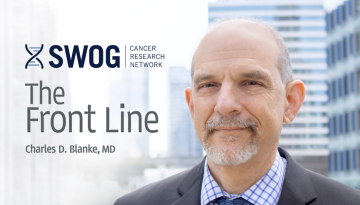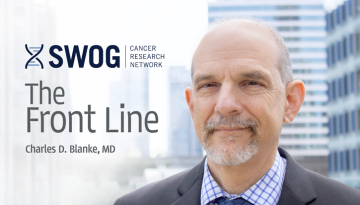New Results in Population Science
In our recent NCORP Research Base grant application, we said our trials strive to be relevant, add value, and have “significant potential impact.” Well, they do – and there is proof in two SWOG NCORP trial results released recently in JAMA Oncology.
Last week, SWOG biostatistician Dr. Joe Unger served as lead author of a study that showed that patients with cancer and other comorbidities, such as asthma, are less likely to talk with their health care provider about a clinical trial, are less likely to be offered the opportunity to join a study, and ultimately are less likely to enroll. The analysis is particularly timely, putting the first-ever number on the potential impact that recent ASCO clinical trial eligibility recommendations would have for patients with comorbidities. If they’re fully rolled out, the ASCO recommendations would provide study opportunities for up to 6,317 patients each year – thus affording investigational treatment options that might extend and/or improve their lives. The SWOG study is the first to examine the relationship between patient comorbidities and trial participation using real-world, patient-level data.
Coincidentally, Dr. Scott Ramsey and his team have been studying the prevalence of hepatitis B and C and HIV in patients with cancer. The results of their trial, S1204, were published this week and are notable for a couple of reasons. The study was big, enrolling over 3,000 urban and rural patients. In fact, it was the largest hepatitis and HIV prevalence study ever in those with neoplasms. And the trial participant pool was diverse – including 18 percent of African-American and 18 percent of Latino heritage.
The results themselves were eye-opening: Ramsey and his team found an alarmingly high rate of undiagnosed acute and chronic hepatitis B and C. Many had no identifiable risk factors for these infections.
Moreover, the findings suggest that universal screening for hepatitis B or C may be warranted. A variety of cancer treatments – including immunotherapy – can cause reactivation of hepatitis. Anti-CD20 therapies, such as rituximab, as well as hematopoietic cell transplantation, can specifically cause viral reactivation and multiplication.
Both SWOG studies provide significant new data on timely topics. Relevance! Their ultimate impact, of course, remains to be seen. But the Unger study raised awareness, receiving a lot of attention on Twitter and in the press, and Ramsey’s work is certain to fuel debate about the potential need for hepatitis screening in the oncology community. And there’s more to come: Ramsey and his team are already at work analyzing results of a major SWOG cost effectiveness study. Read the Unger press release here, and the Ramsey release here.
I want to commend all of our NCORP researchers. I also want to thank Dr. Dawn Hershman – an author on both papers and the head of our population science portfolio. It’s one of our greatest strengths, under Dawn’s leadership, and I believe our NCORP studies will make a huge impact for decades to come.
Other Recent Stories



